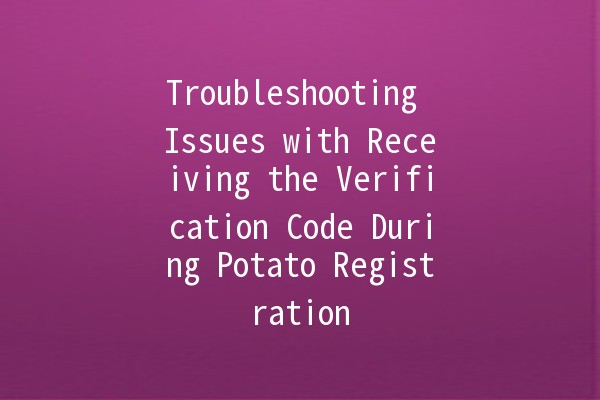Potato, a growing platform, simplifies various tasks and enhances productivity for its users. Yet, one common hurdle many encounter is the inability to receive the verification code during registration. This article explores practical solutions to ensure a smooth registration process, along with five specific productivity tips to enhance your overall experience on the platform.
Understanding the Importance of Verification Codes
Verification codes serve as an essential security measure to protect users' accounts. Without this step, it would be easier for unauthorized parties to gain access to sensitive information. However, various factors may hinder code reception. Understanding these challenges can lead to more effective troubleshooting.

Common Reasons for Not Receiving Verification Codes
Recognizing these common issues is the first step to resolving the problem efficiently.
Productivity Tip 1: Ensure Network Stability
A stable internet or cellular connection is paramount when registering for online services.
Practical Application
Check Signal Strength: Look at your device’s signal indicator. If the signal is weak, try moving to an area with better reception.
Switch Networks: If you're using WiFi, consider switching to mobile data or vice versa.
Restart Your Device: Sometimes, simply rebooting your device can help restore connection issues.
Productivity Tip 2: DoubleCheck Your Phone Number
Input errors are a frequent cause of verification code issues.
Practical Application
Format Correctly: Ensure that you enter your phone number, including the country code (e.g., +1 for the USA).
Avoid Spaces and Special Characters: Enter the number as a continuous string of digits to prevent system confusion.
By verifying your input, you can ensure your messages are delivered correctly.
Productivity Tip 3: Review Device Notification Settings
Device settings may block notifications from the Potato app.
Practical Application
Check App Permissions: Make sure that the Potato app has permission to send notifications.
Disable Do Not Disturb Mode: This feature silences all notifications. Turn it off temporarily during registration.
Adjusting these settings may resolve notification issues, ensuring timely delivery.
Productivity Tip 4: Use an Alternative Contact Method
If SMS messages are not being delivered, consider an alternative.
Practical Application
Opt for Email Verification: Many services provide the option of using email instead of SMS for verification. Check if Potato offers this feature.
Contact Support: If issues persist, reaching out to Potato’s support team through their official channels may provide additional solutions.
Exploring alternative methods can often bypass any technical obstacles currently being experienced.
Productivity Tip 5: Clear Spam Filters Regularly
Sometimes, messages end up in your spam folder due to aggressive filtering settings.
Practical Application
Check Spam Folder: Regularly inspect your spam or junk folder for any missed messages.
Whitelist Potato: Adding Potato's messaging numbers or email addresses to your contacts can prevent future redirection.
By maintaining a clean and organized inbox, you reduce the chances of missing important messages.
Frequently Asked Questions
If none of the above solutions work, you may want to wait a few minutes and try to resend the verification code. If the issue persists, consider reaching out to Potato’s customer support for further assistance.
Yes, most platforms limit the number of verification codes you can request within a certain timeframe to prevent abuse. Typically, you might be allowed to request a new code every few minutes.
Yes, you can usually change your registered phone number in your account settings. Make sure to verify the new number with the correct code to complete the process.
If you suspect that the issue might be on Potato's end, check their official website or social media channels for any updates regarding server outages or maintenance periods.
Using a VPN may affect the delivery of your verification code, especially if you are connected to a server in a different region. This can potentially lead to delays or blocking of messages.
While it is rare, certain budget smartphones or those with outdated software may have trouble receiving automated SMS messages. Ensure your device's software is up to date for optimal performance.
By following these troubleshooting steps and productivity tips, users can effectively navigate the challenges associated with receiving verification codes during Potato registration. A seamless registration process not only enhances user experience but also fosters a secure environment for all users on the platform.